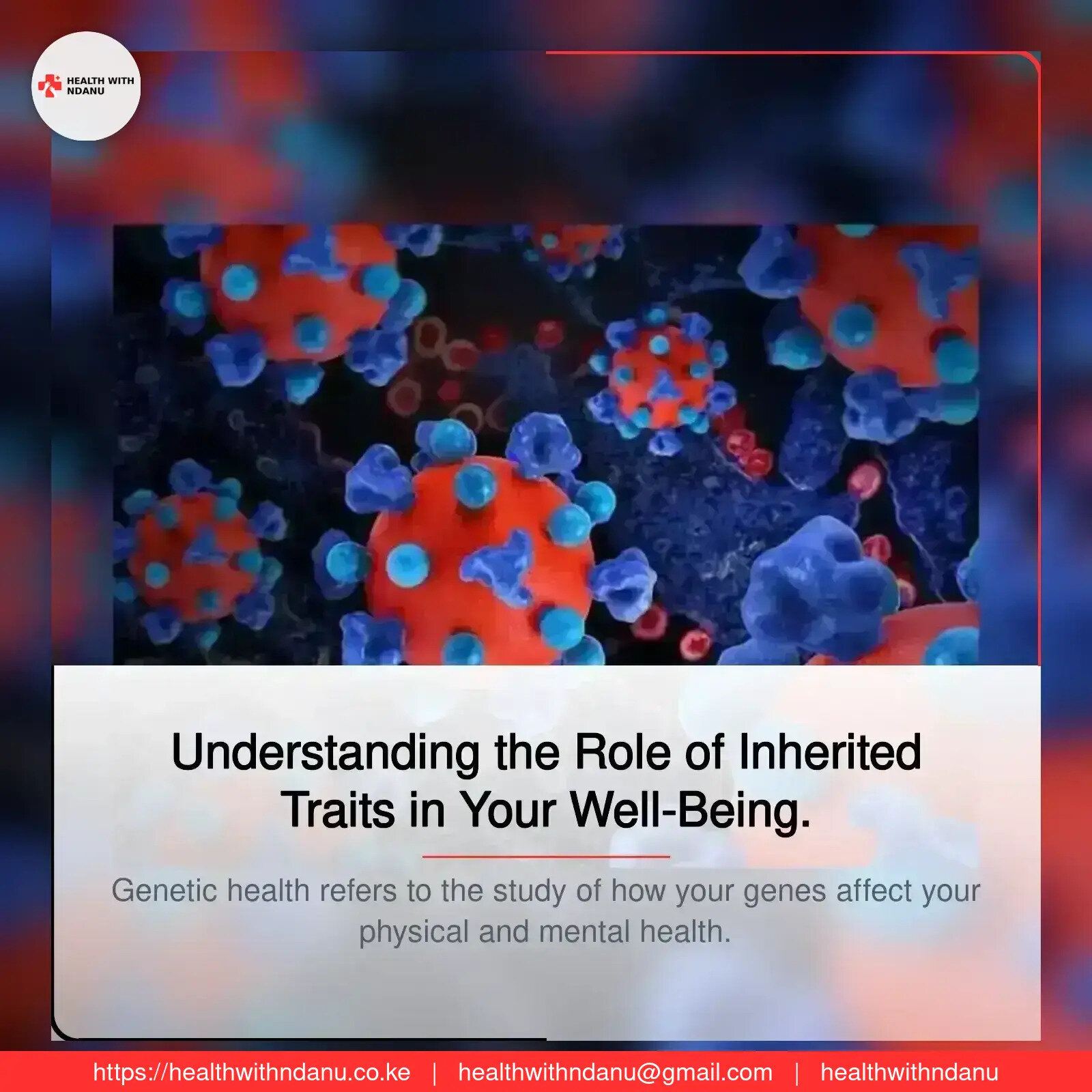Understanding the Role of Inherited Traits in Your Well-Being.



Introduction
In today’s age of personalized medicine and genetic testing, understanding genetic health has become increasingly important. It’s not just about the DNA that defines our appearance; it’s about how our inherited traits influence our overall health. Whether you’re curious about your family history of hereditary conditions or considering genetic testing, this guide breaks down what genetic health is, how it impacts your life, and how to take proactive steps for better well-being.
What is Genetic Health?
Genetic health refers to the study of how your genes affect your physical and mental health. Genes are the basic units of heredity, passed down from your parents, that determine everything from your eye color to your susceptibility to certain diseases.
Some genes are “active,” while others remain dormant, but environmental factors and lifestyle choices can trigger genetic conditions. For example, a person with a family history of diabetes might not develop the disease unless environmental factors—like an unhealthy diet or lack of exercise—activate the predisposed gene.
Why Is Genetic Health Important?
Understanding genetic health can help you:
- Identify Risks Early: If your family has a history of hereditary conditions like cancer, heart disease, or diabetes, you can take preventive measures.
- Make Informed Lifestyle Choices: Knowing your genetic predispositions allows you to make better lifestyle decisions, such as adopting a healthier diet or exercising regularly.
- Access Personalized Healthcare: Advances in genetic research enable doctors to tailor treatments to your unique genetic makeup, leading to better outcomes.
Hereditary Conditions: What You Should Know
Hereditary conditions are illnesses or disorders passed down through generations due to shared genetic material. Some of the most common hereditary conditions include:
1. Cardiovascular Diseases
A family history of high blood pressure, high cholesterol, or heart attacks may indicate a genetic predisposition to cardiovascular problems. Lifestyle modifications and regular check-ups can significantly reduce risks.
2. Cancer
Certain types of cancer, such as breast, ovarian, and colorectal cancer, have strong genetic links. For example, mutations in the BRCA1 and BRCA2 genes can increase the likelihood of developing breast or ovarian cancer.
3. Diabetes
Type 2 diabetes often runs in families. If your parents or siblings have diabetes, your risk increases. Managing weight, diet, and physical activity can help offset these risks.
4. Sickle Cell Anemia
A hereditary blood disorder commonly affecting individuals of African, Mediterranean, and Indian descent, sickle cell anemia occurs when abnormal hemoglobin causes red blood cells to become rigid and sticky.
5. Cystic Fibrosis
This inherited condition affects the respiratory and digestive systems. Genetic testing can help identify carriers of the cystic fibrosis gene.
The Role of Genetic Testing in Managing Genetic Health
Genetic testing has revolutionized how we understand hereditary conditions. With just a simple saliva or blood sample, genetic tests can identify potential risks and guide preventive healthcare strategies.
Benefits of Genetic Testing
1. Early Detection: Genetic testing can reveal predispositions to diseases before symptoms appear.
2. Tailored Treatment Plans: Personalized medicine, based on genetic data, ensures treatments are effective and minimize side effects.
3. Family Planning: For couples, genetic testing can identify risks of passing on hereditary conditions to children.
Types of Genetic Tests
- Diagnostic Testing: Determines whether you have a specific genetic condition.
- Predictive Testing: Assesses your risk of developing a hereditary condition.
- Carrier Testing: Identifies whether you carry a gene for a hereditary condition.
How to Maintain Good Genetic Health
While you can’t change your DNA, there are steps you can take to reduce the impact of genetic predispositions:
1. Know Your Family History
Discuss your family’s health history with relatives. Understanding common illnesses in your family can provide clues about your genetic risks.
2. Adopt a Healthy Lifestyle
- Eat a Balanced Diet: Focus on whole foods rich in nutrients, including fruits, vegetables, lean proteins, and whole grains.
- Stay Active: Regular exercise helps manage weight and reduces the risk of activating genetic predispositions.
- Avoid Smoking and Excessive Alcohol: These can exacerbate genetic risks for conditions like cancer and heart disease.
3. Schedule Regular Check-Ups
Routine screenings and health check-ups can catch potential issues early, even if you feel healthy.
4. Consider Genetic Counseling
Genetic counseling can help you understand your risks and make informed decisions. A genetic counselor can explain test results and recommend preventive measures or treatment plans.
Debunking Myths About Genetic Health
There are many misconceptions about genetic health. Let’s clear up some common myths:
Myth 1: "If it’s in my genes, I’m doomed."
Truth: Genetics influence risk but don’t guarantee outcomes. Lifestyle and environmental factors also play significant roles.
Myth 2: "Genetic testing is only for people with a family history of disease."
Truth: Even without a known family history, genetic testing can reveal unexpected risks.
Myth 3: "Genetic health only focuses on physical illnesses."
Truth: Genetic health also encompasses mental health, as some conditions, like depression and anxiety, have genetic components.
The Future of Genetic Health
Advances in genetic research are paving the way for:
- Gene Editing: Technologies like CRISPR may allow scientists to “fix” harmful genetic mutations.
- Pharmacogenomics: Personalized medications based on your genetic profile could become the norm.
- Preventive Healthcare: Widespread genetic screening may lead to earlier interventions and better health outcomes.
Take Charge of Your Genetic Health
Your genetic makeup is a roadmap, not a destiny. By understanding your genetic health, you can make informed choices that empower you to live your best life. Whether it’s through genetic testing, adopting healthier habits, or staying informed about hereditary conditions, proactive steps today can lead to a healthier tomorrow.
Curious about your genetic health? Start by talking to a healthcare provider or genetic counselor. Remember, knowledge is power—and in the case of genetic health, it’s also the key to prevention and personalized care.
Una uzoefu wako? Shiriki nasi
Popular Categories
Most Visited Blogs
Daily Newsletter
Get all the top stories from Blogs to keep track.



